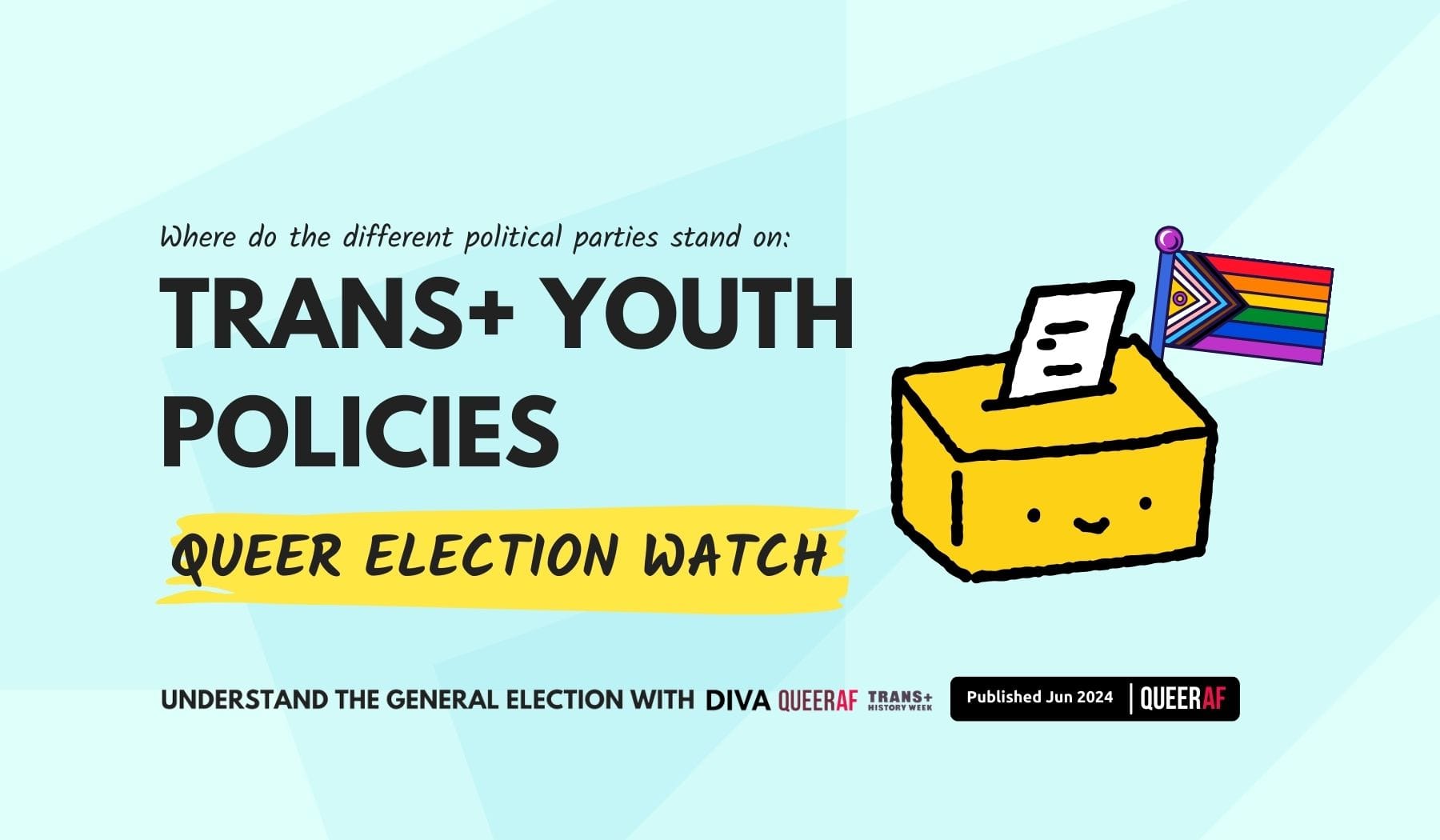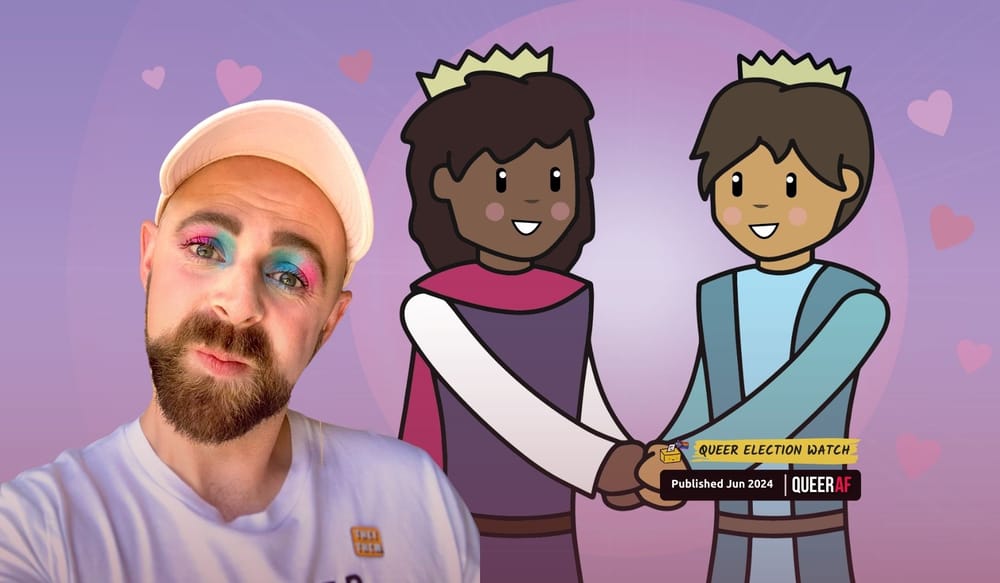
What are the big policy issues that impact trans+ children and sex education?
Misinformation and scaremongering about trans+ children has become commonplace in our press and politics over recent years as part of the so-called “culture wars”.
Because of this, policies that impact trans+ children and young people, such as gender-affirming healthcare, sex education and inclusion in schools, have come under enormous pressure to deliver culture war priorities.
This is clearly disproportionate and unfair: trans+ children and young people are a small and vulnerable population.
We don’t have great data about how many trans+ children and young people live in the UK. Data from the England and Wales Census tells us that 1% of 16-25-year-olds are trans, so it’s reasonable to assume that around 1% of children and young people will grow up to be trans+, and some of those children and young people will know they are trans+ from a relatively young age.
Trans+ children are at high risk of experiencing rejection and conflict within their families and of being bullied at school. Research by the charity Just Like Us found that 10% of trans children are bullied daily, and 51% have been bullied in the last year.
Where do the different political parties stand on policies about trans+ youth and sex education?
🔵 Conservatives
The Conservative government has implemented extremely restrictive policies on gender-affirming healthcare for trans+ children and young people and has opened a consultation on school inclusion that could see trans+ pupils prevented from socially transitioning and banned from single-sex sport and bathrooms. They’ve also opened a consultation on relationships and sex education that could prevent teachers from discussing “gender identity” in a move that is reminiscent of Section 28 (the infamous 1988 - 2003 law, introduced by a Conservative government, which banned local authorities and schools from “the promotion of homosexuality”). Both will be left for the incoming government to analyse and respond to.
In advance of the publication of the Cass Review, policy on access to gender-affirming healthcare through NHS England was radically changed, with NHS Scotland introducing similarly restrictive policies after the Review’s publication.
The result of these policy changes is that trans+ children and young people in the UK will only be able to access puberty blockers through the NHS as part of a clinical trial that has not yet been commissioned.
Responding to the publication of the Cass Review in parliament, then Secretary of State for Health, Victoria Atkins, used inflammatory language and made the baseless claim that “the NHS was overtaken by a culture of secrecy and ideology that was allowed to trump evidence and safety”. Building on this, in the last hours prior to dissolution of parliament, Victoria Atkins used powers in the Medicines Act to lay an emergency temporary order banning private prescriptions of puberty blockers for trans+ children and young people.
Taken together, this means that it is currently illegal to issue any new prescriptions of puberty blockers for trans+ children and young people in the UK. It remains legal to issue new prescriptions of the same drug to children experiencing precocious puberty.
In addition to this, the outgoing Conservative government published two key consultations in the schools policy arena: one on “gender questioning children in schools” and one on relationships and sex education.
The draft schools guidance contains a number of proposals that, if implemented would make it almost impossible for trans+ children and young people to socially transition (change their name and pronouns) at school. They would also make it very difficult for trans+ children and young people to use facilities they feel safe and comfortable in or to participate in school sports. Finally, the draft guidance seeks to protect both children and staff who express “gender critical” views, meaning that children and adults would be able to bully trans+ children and young people at school with impunity.
This draft guidance is non-statutory and subject to consultation. However, the outgoing government has already issued changes to the statutory safeguarding guidance Keeping Children Safe In Education that significantly alter the approach to safeguarding trans+ children and young people and link Keeping Children Safe In Education to the policies set out in the draft “gender questioning children in schools” guidance.
The draft Relationships and Sex Education guidance proposes a number of changes to the approach to statutory RSE, some of which would impact all LGBTQIA+ children. These include extending parental rights to review all materials being used in RSHE lessons, which, together with the parental right to withdraw children from sex education lessons and proposed restrictions on the content of relationship education, could leave some LGBTQIA+ children without access to information and support they desperately need.
It also proposes that RSE content on trans+ topics should be restricted to teaching about the concept of “gender reassignment”, by which the guidance appears to mean legal recognition of gender under the Gender Recognition Act. It proposes that no other teaching about trans+ identities or lives is allowed, stating that: “Schools should not teach about the broader concept of gender identity. Gender identity is a highly contested and complex subject. It is a sense a person may have of their own gender, whether male, female or a number of other categories.”
Analysis: If re-elected, the Conservative party has made clear it will pursue a policy agenda that makes it almost impossible for children and young people to transition, whether medically or socially. Similarly, it is clear the Conservative party is committed to a restrictive version of relationships and sex education that almost completely erases the existence of trans+ people.
🔴 Labour
Labour’s Shadow Secretary of State for Health, Wes Streeting, has publicly welcomed and supported the Conservative approach to gender-affirming healthcare for trans+ children and young people. Responding to the publication of the Cass Review in Parliament, he not only welcomed the ending of prescriptions for puberty blockers through the NHS but also urged the government to end the ability of private healthcare providers to prescribe puberty blockers to trans+ children and young people. When Victoria Atkins announced her intention to introduce a temporary banning order on private prescriptions of puberty blockers, he welcomed her announcement.
When it comes to schools policy the picture is less clear, and indications are that the Labour position may be at least somewhat distinctive. Responding to the consultation on school guidance, the Shadow Secretary of State for Education, Bridget Phillipson, has taken a more nuanced position and has strongly pushed back against schools becoming the “new frontier” of the culture wars.
Similarly, Labour has not publicly endorsed or condemned the approach set out in the draft guidance on relationships and sex education.
Analysis: If re-elected, Labour is likely to support the Conservative approach to restricting access to gender-affirming health care for trans+ children and young people and has signalled it will seek to extend the emergency banning order on private prescriptions of puberty blockers.
When it comes to schools policy, it seems likely that the Labour approach to both school guidance and relationships and sex education will be at least somewhat different from the Conservative approach. However, it is important to consider that Labour has not been willing to take a strong stance on the rights of trans+ people for a significant period of time, so differences in policy approach may be relatively minor.
🟡 Liberal Democrats
Liberal Democrat leadership does not appear to have publicly responded to recent government changes in access to gender-affirming health care for trans+ children and young people or to proposed changes in schools policy. They do have a history of consistently speaking out against the use of trans+ children and young people as a “culture war” gambit.
The Lib Dem manifesto confirms their commitment to “delivering high-quality relationships and sex education”, though it does not specifically address the needs of LGBTQIA+ pupils.
Analysis: If elected, it is unclear what the Liberal Democrat position would be on these critical areas of policy for trans+ children and young people and their families. However, their manifesto commits to high-quality relationships and sex education, and they have signalled some opposition to the proposed curriculum changes in this area (though these have not focused on LGBTQIA+ content).
🏴 Scottish National Party
In the wake of the publication of the Cass Review, NHS Scotland changed its approach to the prescription of puberty blockers, ending new prescriptions of puberty blockers to trans+ children and going further than Cass recommended by also ending referrals for hormone therapy for 16-18 year olds.
The SNP government welcomed this change, with Scottish Health Secretary Neil Gray saying, “We have been clear it is for clinicians and health boards to make decisions about clinical pathways, and that these decisions should be made carefully and based on the best evidence available. This is what both health boards have done, and their position is supported by the Chief Medical Officer.”
SNP leaders in Holyrood and Westminster have not commented on the temporary banning order on private prescriptions.
In sharp contrast, the SNP government remains committed to its own schools guidance. Published in 2021, Supporting Transgender Pupils in Schools sets a positive standard for Scottish schools on the inclusion of trans+ children and young people. Responding to press enquiries, the SNP government has confirmed it does not intend to review the approach to Relationships and Sex Education in Scottish schools in the context of the Westminster government’s consultation.
Analysis: The SNP are likely to continue to support the Conservative approach to gender-affirming healthcare for trans+ children and young people.
However, they remain committed to the inclusion of trans+ children and young people in schools and colleges, as well as to the teaching of inclusive RSE.
🟢 Green Party
The Green Party leadership does not appear to have publicly responded to the significant changes in access to gender-affirming healthcare for trans+ children. However, it has been widely reported that the change of policy in Scotland was one of the contributing factors to the decision to end the power-sharing agreement with the SNP.
On schools inclusion and on relationships and sex education, the Green Party has a consistent history of supporting LGBTQIA+ inclusion and trans+ inclusion. In its manifesto it has committed to “Retain a full, evidence-based and age-appropriate programme of Relationships, Sex and Health Education, including LGBTIQA+ content and resources.”
Before the release of their manifesto, the Green Party’s Equality spokesperson Ria Patel described proposed changes to the Relationships and Sex Education Curriculum as “another Section 28”. She also urged people to complete the consultation about trans+ children and young people in schools, saying, “the guidance should help teachers create a safe & supportive space for all students - not try to deny the existence of trans youth”. In Scotland, positive commitments on Relationships and Sex Education formed part of the SNP/Green Programme for Government.
Analysis: Like the Liberal Democrats, the Green Party have not publicly aligned with the Conservative approach to gender-affirming healthcare for Trans+ children and young people.
Along with the SNP, they remain clearly and publicly committed to the inclusion of trans+ children and young people in schools and colleges, as well as to the teaching of inclusive RSE.
Analysis: Why should LGBTQIA+ voters care about what the major parties say about support and care for trans+ youth?
The outgoing Conservative government has driven this area of policy to a point where we are at risk of implementing rules and regulations that will harm a whole generation of trans+ children, just as a whole generation of LGBTQIA children was harmed by Section 28.
Stay tuned to Queer Election Watch for more on the issues that matter to you. Check out the most recent policy check, on conversion practices, on DIVA and QueerAF now.











